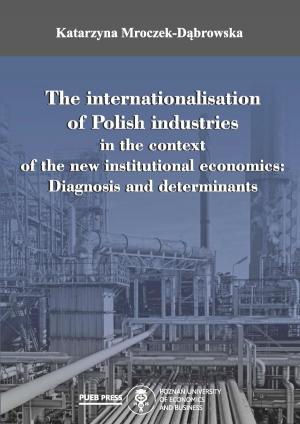
e-ISBN: 978-83-66199-37-8
DOI: 10.18559/978-83-66199-37-8
Edition: I
Publication date: 2019
First publication date: 2019
Pages: 238
Print: paperback
Electronic version: pdf
Format: B5
License : open access
globalisation, Polish industries, internationalisation, industry development, firm life cycle, new institutional economics, agency theory, economic crisis, technological advancement,
last week: 13
last 3 months: 141
Katarzyna Mroczek-Dąbrowska
The internationalisation of Polish industries in the context of the new institutional economics: Diagnosis and determinants
Availability and purchase
Print version(PWN bookstore)Electronic version
(IBUK)Electronic version
(CEEOL)
*Clicking the button takes you to an external open access or selling platform.
The book is available in library subscriptions: Ibuk Libra and EBSCO.
Mroczek-Dąbrowska, K. (2019). The internationalisation of Polish industries in the context of the new institutional economics: Diagnosis and determinants. Poznań University of Economics and Business Press. https://doi.org/10.18559/978-83-66199-37-8
This monograph touches upon the relatively under-researched subject of the process and degree of industry internationalisation. Situated between the micro- and macroeconomic perspectives, the book deals with economic subsystems which are rarely discussed in the international business literature but which constitute a vital pillar of national economics. As Prof. Krzysztof Wach from the Cracow University of Economics emphasises, the book fills a gap in the Polish publishing market not only regarding the idea itself, but also by applying innovative and up-to-date research methods. Additionally, the monograph not only concerns contemporary issues developed within new institutional economics and internationalisation theory, but has a pragmatic, applicative character aimed at expanding the Polish economy. As Prof. Bogusława Drelich-Skulska from the Wrocław University of Economics stresses, the issues discussed have a significant meaning for both developed and developing economies.
Introduction
1. Internationalisation as a tool for increasing the dynamics of industry development
1.1. Mesoeconomics as research basis for industry development
1.2. Industry characteristics and their importance in the internationalisation process
1.2.1. The industry life cycle and the internationalisation process
1.2.2. Industry typology and its conseąuences for the internationalisation process
1.3. Research on the degree of industry internationalisation in International business
1.3.1. Industry internationalisation and globalisation-conceptual differences
1.3.2. The concept and meaning of the degree of internationalisation in international business
1.4. Degree of industry internationalisation-a review of empirical research
1.5. Operationalisation of the degree of industry internationalisation
1.5.1. Degree of industry internationalisation-outward approach
1.5.2. Degree of industry internationalisation-inward approach
1.6. Degree of industry internationalisation and level of industry development
1.7. The role of the state in shaping the degree of industry internationalisation
Summary
2. The degree of industry internationalisation-conceptual framework
2.1. Company internationalisation determinants from a mesoeconomic perspective
2.1.1. Resource-based determinants of the degree of internationalisation
2.1.2. Industry network embeddedness as a conceptual basis for degree of internationalisation research
2.1.3. Behavioural internationalisation models
2.1.4. New institutional economics in the study of the internationalisation process
2.1.4.1. The agency theory and the degree of internationalisation
2.1.4.2. Transaction cost theory and the degree of internationalisation
2.2. Levels of economic analysis and new institutional economics
2.3. New institutional economics in mesoeconomic analysis
2.3.1. New institutional economics as a supplementation to neoclassical economic analysis
2.3.2. Bounded rationality and opportunism as a conceptual basis for the new institutional economics
2.4. Transaction costs in degree of industry internationalisation research
2.4.1. The transaction costs notion-conceptual differences
2.4.1.1. Transaction costs as a conseąuence of property rights transfer
2.4.1.2. Transaction costs and the naturę of transactions
2.4.2. The role of transaction costs in firm and industry level analysis
Summary
3. The degree of industry internationalisation from the perspective of new institutional economics-research and empirical model design
3.1. Research scheme and procedurę
3.1.1. Level of industry transaction costs
3.1.2. Industry life cycle
3.1.3. Industry type
3.1.4. The degree of industry inward internationalisation
3.1.5. Technological advancement of an industry
3.1.6. Level of industry rivalry
3.1.7. The general macroeconomic conditions
3.2. Research sample selection and breakdown
3.3. Operationalisation of variables
3.3.1. Comments on the transaction cost operationalisation attempts
3.3.2. Measurement of transaction costs-applied approach
3.4. Research limitations
Summary
4. The impact of the economic crisis on the macroeconomic and industry situation in Poland
4.1. Europe‘s developmental indicators between 2007 and 2015
4.2. The impact of the economic crisis on Poland
4.3. The situation of Polish industries during and after the crisis
Summary
5. The degree and determinants of industry internationalisation-the case of Poland
5.1. Degree of industry internationalisation measure-establishing the weights
5.2. Degree of industry internationalisation and its characteristics-chosen aspects
5.3. An attempt at industry segmentation-cluster analysis through the lens of internationalisation
5.4. Industry internationalisation determinants in Poland
5.5. Degree of industry internationalisation and level of transaction costs-the impact of economic stability
5 6. Changes in the degree of internationalisation of Polish industries-a qualitative overview
5.6.1. Industry with the highest increase in its degree of internationalisation between 2007 and 2015
5.6.2. Industry with the highest decrease in its degree of internationalisation between 2007 and 2015
5.7. Internationalisation of Polish industries and governmental aid
5.8. Internationalisation of Polish industries and changes in the international arena
Summary
Conclusions
Appendix 1
Delphi method study questionnaire
Appendix 2
Respondents in the Delphi method study-overview
Appendix 3
Notes on the consolidation of financial statements
Appendix 4
Indicators used in measuring transaction costs-profit and loss account by nature
Appendix 5
Degree of industry internationalisation between 2007 and 2015
Appendix 6
Ranking of activities during the economic crisis
Appendix 7
Ranking of activities during the time of prosperity
References
List of Tables
List of Figures
List of Charts



 Full text download (pdf)
Full text download (pdf)